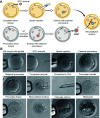Generation of mitochondrial replacement monkeys by female pronucleus transfer
- PMID: 38485499
- PMCID: PMC11017074
- DOI: 10.24272/j.issn.2095-8137.2023.287
Generation of mitochondrial replacement monkeys by female pronucleus transfer
Abstract
Mutations in mitochondrial DNA (mtDNA) are maternally inherited and have the potential to cause severe disorders. Mitochondrial replacement therapies, including spindle, polar body, and pronuclear transfers, are promising strategies for preventing the hereditary transmission of mtDNA diseases. While pronuclear transfer has been used to generate mitochondrial replacement mouse models and human embryos, its application in non-human primates has not been previously reported. In this study, we successfully generated four healthy cynomolgus monkeys ( Macaca fascicularis) via female pronuclear transfer. These individuals all survived for more than two years and exhibited minimal mtDNA carryover (3.8%-6.7%), as well as relatively stable mtDNA heteroplasmy dynamics during development. The successful establishment of this non-human primate model highlights the considerable potential of pronuclear transfer in reducing the risk of inherited mtDNA diseases and provides a valuable preclinical research model for advancing mitochondrial replacement therapies in humans.
线粒体 DNA(mtDNA)的突变是母源遗传的,它可能导致严重的疾病。线粒体替代疗法是一种防止线粒体突变导致的疾病传播的有效方式,它包括纺锤体移植技术、极体移植技术和原核移植技术。原核移植技术之前已经应用于小鼠和人类中,并获得了线粒体置换的小鼠个体和线粒体置换的人类囊胚。而目前在非人灵长类中,尚未利用原核移植技术获得出生个体。在该研究中,我们利用雌原核移植的方式成功获得了四只健康的食蟹猴,目前他们都已经两岁多,并且在发育过程中,他们表现出少量的线粒体残留(3.8%-6.7%)和相对稳定的异源线粒体动态变化。因此,非人灵长类动物模型中的结果表明,原核移植技术在降低遗传性线粒体突变导致疾病的风险方面有的巨大潜力。这为线粒体替代疗法在人线粒体疾病治疗上提供了一个有用的临床前研究模型。.
Keywords: Female pronuclear transfer; Mitochondrial replacement; Non-human primates.
Conflict of interest statement
The authors declare that they have no competing interests.
Figures
References
MeSH terms
Substances
LinkOut - more resources
Full Text Sources
Medical




